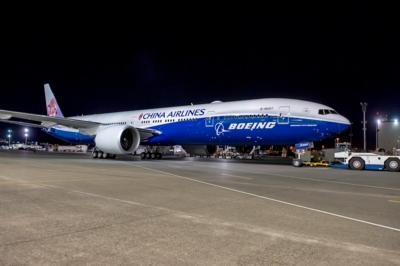Fri, Jun 28, 2024
China’s CAAC Pauses Deliveries to Analyze Revised Cockpit Voice Recorder
Boeing finally got some good news from back east, hearing that Chinese regulators are approving their widebody aircraft for importation again.

That should help them clear out its backlogs of 777 and 787s waiting to be delivered to customers in China, but the 737 Max family remains held up. The widebody Boeings didn't get to enjoy their delivery window for too long, being shut out from 2019 to only a couple weeks before New Year 2024. Only a few months passed until the Civil Aviation Administration of China announced that it would again suspend entry of new Boeing aircraft into the country. Deliveries were apparently halted this time over reviews needed for the 25-hour cockpit voice recorder, and the lithium battery that comes with it.Rumor has it that the 737 Max holdup will be lifted next month, allowing Boeing to clear out dozens of aircraft waiting for delivery to China. So far, since the beginning of the year, Boeing has managed to deliver about two dozen aircraft to Chinese clients, after ending last year with 85 waiting to be shipped out to their eastern clientele.

It's a little odd that the CAAC didn't approve of the new CVR Boeing now ships with its planes. The new unit meets the provision of the recent FAA reauthorization bill that demands all new aircraft come equipped with a cockpit voice recorder boasting a 25-hour retention span. The idea of a 25-hour minimum made its way into European rules a decade prior, but the FAA has only now been granted a mandate to establish its own framework to institute the same. Recent near-hits and mishaps have really driven home the point of longer cockpit recording systems, particularly with the embarrassment surrounding the highly visible Alaska Airlines MAX 9 flight that headlined for months earlier this year. After the aircraft landed, nobody on the ground staff had remembered to pull the breaker for the CVR, meaning the unit overwrote the entirety of the incident flight, losing crucial information and context right as the investigation began.
Other regulators, like the FAA and the EASA had no problem approving it for use, and the track record of duty-spec lithium batteries used in professional (and expensive) American products certainly doesn't give any reason to expect spontaneous combustion. Unfortunately the tight-lipped CAAC doesn't really say much about it to the public, leaving some to wonder whether it really was a simple objection to a new and unapproved battery, or a famously intrusive government making sure their rivals aren't shipping a tattletale system of their own.
More News
Pilot Applied Full Aft Stick And Nose-Up Trim, But The Airplane Remained On The Runway Analysis: The pilot reported that a preflight inspection and flight control checks revealed n>[...]
A Few Questions AND Answers To Help You Get MORE Out of ANN! 1) I forgot my password. How do I find it? 1) Easy... click here and give us your e-mail address--we'll send it to you >[...]
From 2022 (YouTube Edition): Before They’re All Gone... Humankind has been messing about in airplanes for almost 120-years. In that time, thousands of aircraft representing i>[...]
Advanced Air Mobility (AAM) A transportation system that transports people and property by air between two points in the NAS using aircraft with advanced technologies, including el>[...]
Aero Linx: MQ-1B Predator The MQ-1B Predator is an armed, multi-mission, medium-altitude, long-endurance remotely piloted aircraft that is employed primarily as an intelligence-col>[...]
 NTSB Final Report: Douglas A-4K
NTSB Final Report: Douglas A-4K ANN FAQ: Q&A 101
ANN FAQ: Q&A 101 Classic Aero-TV: PBY Catalina--From Wartime to Double Sunrise to the Long Sunset
Classic Aero-TV: PBY Catalina--From Wartime to Double Sunrise to the Long Sunset ANN's Daily Aero-Term (07.01.25): Advanced Air Mobility (AAM)
ANN's Daily Aero-Term (07.01.25): Advanced Air Mobility (AAM) ANN's Daily Aero-Linx (07.01.25)
ANN's Daily Aero-Linx (07.01.25)




